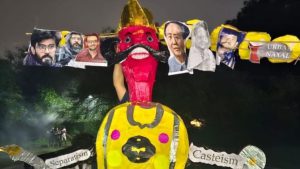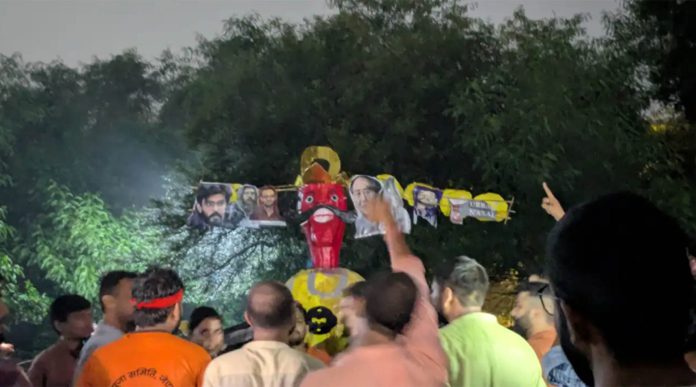Ravan Dahan at JNU triggers major controversy as ABVP burns effigies of Umar Khalid and Sharjeel Imam, while JNUSU accuses them of spreading Islamophobia and communal politics.
By Qalam Times News Network | New Delhi | October 2, 2025
Ravan Dahan at JNU Triggers Political Storm
The staging of a Ravan Dahan by the Akhil Bharatiya Vidyarthi Parishad (ABVP) at Jawaharlal Nehru University (JNU) on Thursday set off heated clashes on campus. The event depicted former JNU students and anti-CAA activists Umar Khalid and Sharjeel Imam as Ravana, a move that the JNU Students’ Union (JNUSU) condemned as a “deliberate ploy to exploit religion and fuel Islamophobia.”

Despite heavy rain, JNUSU mobilized a human chain protest at Sabarmati Tea Point to counter what it described as a dangerous precedent of publicly targeting imprisoned activists who are still facing trial.
Clashes and Counterclaims
The protest soon turned volatile as ABVP supporters allegedly shouted slogans like “Hang Sharjeel Imam” and “Hang Umar Khalid,” alongside chants glorifying Nathuram Godse. JNUSU President Nitish Kumar accused ABVP of staging a “public trial on the streets” while ignoring figures such as Gandhi’s assassin Godse or convicted rapist Baba Ram Rahim.
In contrast, ABVP claimed left-wing students hurled wooden blocks during Durga idol immersion near Sabarmati T-Point, injuring several participants. Both sides traded blame over stone pelting and intimidation, while campus authorities stepped in to monitor tensions.
ABVP’s Statement on the Ravan Dahan
ABVP justified the Ravan Dahan as a symbolic act marking Vijayadashami. According to its statement, Ravana’s multiple heads were portrayed with faces of Khalid, Imam, Afzal Guru, Charu Mazumdar, and Kanu Sanyal—representing what it called “Naxalism, Leftism, Maoist violence, and anti-national ideologies.”
“This is the same campus where Mahishasur Day was celebrated and anti-national slogans were raised. By burning these effigies, we reaffirm that there is no place for separatist forces here,” the ABVP said.
JNUSU’s Rebuttal
Rejecting these claims, JNUSU argued that ABVP deliberately chose October 2—Mahatma Gandhi’s birth anniversary—for the effigy burning, while avoiding any mention of Godse, Gandhi’s killer. The students’ union called it “politically motivated, communally charged, and historically consistent with RSS’s practice of weaponizing religion against dissent.”
JNUSU added that instead of effigies of students under trial, ABVP could have depicted leaders like Anurag Thakur or Parvesh Verma, who were accused of inciting violence during the 2020 Delhi riots but continue to enjoy impunity.
Wider Context of the Dispute
The controversy comes against the backdrop of ongoing court proceedings where Khalid, Imam, Gulfisha Fatima, and Meeran Haider remain imprisoned under the Unlawful Activities (Prevention) Act (UAPA). Their bail pleas have been repeatedly adjourned, with some detainees spending over 2,000 days in jail since the anti-CAA protests.
For JNUSU, the incident highlights a broader trend of “stoking Islamophobia to divide students and silence dissent.” For ABVP, the Ravan Dahan was about reclaiming campus space from ideologies they believe threaten India’s unity.







